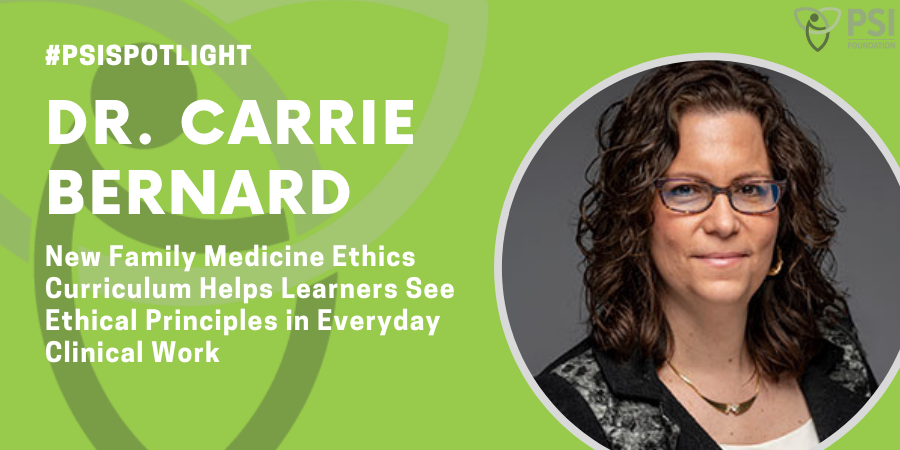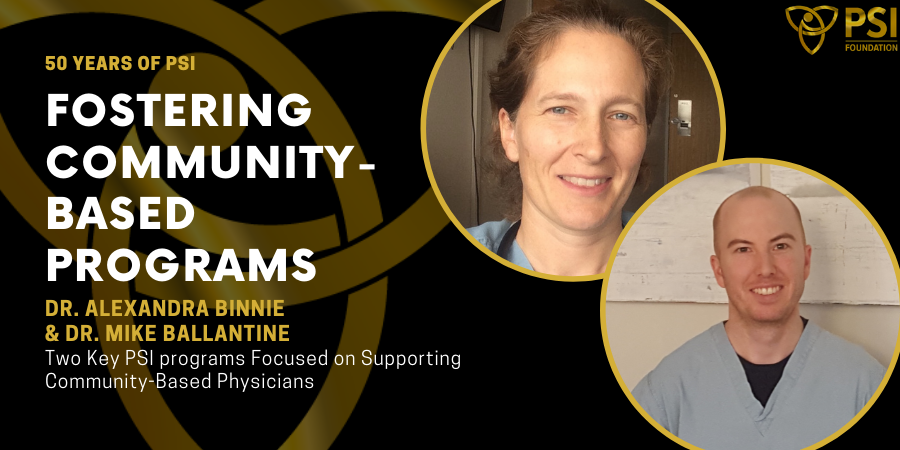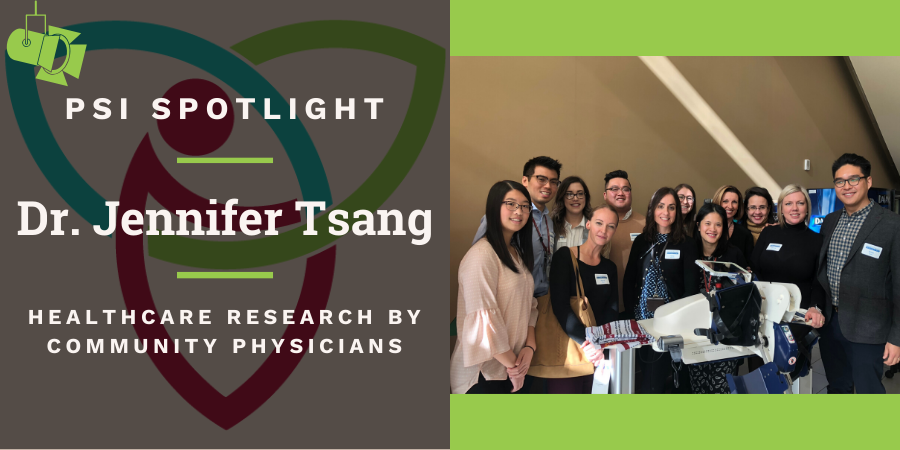As a community-based family physician, Dr. Carrie Bernard examines research questions that are directly relevant to her patients and practice.
“All of my research has come out of the clinical world, and for me, that’s what makes research meaningful,” says Dr. Bernard, physician at William Osler Health Centre in Brampton. “I see myself as firmly planted in the community as a physician. That is my home, and that is what matters to me. I am most interested in research that is going to help my patients in the long run.”
Since she started to undertake research projects over the last decade, she has partnered with researchers to work on projects ranging from humanitarian health care ethics to advanced care planning. One of her most recent projects, funded by a PSI Foundation grant for Medical Education Research that the Post-MD Level, focused on how ethics curriculum is taught to postgraduate family medicine trainees.
Dr. Bernard says that PSI’s support of family physicians and their understanding of their unique research approach helped her feel valued as a researcher.
“PSI felt like the right place to go for this funding because it represents who I am as a physician first and a researcher,” she says. “They understand and expect that as an MD, you will need to partner with a PhD researcher on your project. You’re not viewed as a lesser researcher because of that.”
New ethics curriculum aimed to increase confidence with challenging situations
Dr. Bernard’s transition to doing research was a gradual one. She had been practising as a family physician for several years when she volunteered on a humanitarian trip to northern Uganda with Médicins Sans Frontières (Doctors Without Borders). The experience left her with many questions about how to do humanitarian medical work ethically, but she realized she needed a research-focused education to properly answer the questions.
So, while continuing to practice family medicine fulltime, she earned a master’s degree in public health at the University of Toronto, focusing on global health and ethics.
Her master’s degree opened up new opportunities in academia, and in 2014, she joined U of T’s Department of Family and Community Medicine as Associate Program Director, Curriculum and Remediation. As part of her role, she began working with a team of physicians, ethicists and education experts to re-design how ethics is taught during family medicine residencies.
“One of the main reasons doctors run afoul with regulatory bodies is because of unprofessional behaviour and understanding how to manage these fraught and ethically challenging situations. It’s incredibly important to make sure you have strong ethical judgment to build trusting relationships with patients,” she says. Yet, “Family medicine trainees and even many practising family physicians feel underprepared and unconfident when it comes to ethics.”
Dr. Bernard worked closely on the new curriculum with Dr. Mahan Kulasegaram, director in the Office of Education Scholarship in the Department of Family and Community Medicine and an expert in learning sciences. They, along with the rest of their team, spent more than a year developing a new ethics curriculum that relied on family physicians – not trained ethicists – to teach the curriculum, as well as deliberately integrated ethical principles with the day-to-day work of family medicine.
“You can do a lecture on the principles of ethics, but if it’s not integrated within a realistic case that learners can understand in a clinical way, it seems remote,” she explains. “Our whole interest was really on grounding it in integration in family medicine and basing it on learning principles.”
Dr. Bernard and Dr. Kulasegaram then applied to PSI Foundation to evaluate the new curriculum. They worked with physician teachers at four teaching sites to teach the new curriculum, interviewed residents before and after they completed the curriculum, and evaluated the residents’ performance in the objective structured clinical examination (OSCE).
Positive pilot results help curriculum become self-sustaining
Dr. Bernard says that she and the team were “blown away” by the results. Residents from the pilot sites performed significantly better in a five-station OSCE focused on ethical issues compared to their peers who learned from the standard curriculum. And in the interviews, residents said they had greater awareness of ethical principles and could use a formal ethical deliberation process in challenging situations, which gave them more confidence to act and incorporate patients’ values into ethical deliberations.
Dr. Bernard says she was most pleased with what happened next: based on these results, the pilot sites not only continued using the new curriculum, but also supported the other training sites in implementing it. Having the curriculum become self-sustaining at the training sites was exactly the kind of result that the curriculum redesign team had hoped for.
“Now every single training site in our department is teaching it, and the original sites are acting as helpers,” she says. “We had hoped this would become a ‘train the trainer’ mentorship community of practice, and it just happened naturally that as these teachers became empowered and confident, they started teaching others.”
Having demonstrated these positive results in one department, the team hopes to generate more awareness of the curriculum results among physician teachers and residency program directors at medical schools across the country. In the long-term, she hopes that the curriculum will help more family physicians be more confident in their ethical deliberations and build positive patient relationships.
“Funding good educational research means we’re going to have good doctors in the future,” she says. “PSI’s support of this project is amazing because it directly affects the people – that is, the medical residents – who are going to make a difference in the future.”



